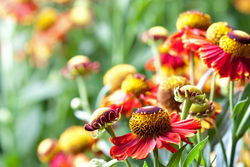Green Fingers in late Summer
Down at Caves Folly Nursery in Colwall, the work never stops.
When planting in your garden, it's worth remembering that some plants pose a risk to health! There are many garden plants that are poisonous but fortunately serious poisoning to humans is very uncommon in the UK.
Plants in most nurseries will have labels indicating if the plant is poisonous, but some do not. Some can even be very toxic if absorbed through the skin and it is best to avoid having them in the garden.
Aconitum napellus (Monkshood) has beautiful fern-like leaves and blue hooded flowers. It should only be handled with thick gloves and its recommended never to grow this near herbs and vegetables, or where children could come into contact with it.
My Culpepper herbal lists dangerous plants like Atropa – also known as Deadly Nightshade. Many others such as Daphne, Digitalis (Foxglove), Arum, Convallaria (Lily of the Valley), Heracleum (Hogweed) and Rue are all toxic to eat or can cause skin irritations.
Don’t let me put you off going in the garden, but it’s worth remembering to always treat plants and fungi with respect. Do not eat any ornamental plants and always wear gloves and long sleeves when cutting back plants or digging up roots, and then wash your hands.
What is interesting about some poisonous plants is their use in homeopathy and conventional medicine as components of drugs. Digitalis was used to treat heart conditions and yew played its part in the development of cancer treatments, to name but two.
Anyway, the work never stops in the garden, so here’s a list of jobs. It’s a busy time of year!
Cutback hardy geraniums and other scruffy perennials, they may reward you with another set of late flowers. Start pruning hedges towards the end of August and cut back herbs.
Take cuttings of half-hardy perennials, gather seeds and cut back old flowers, but don’t dead-head plants that will provide seed for wildlife.
Divide spring plants such as Pulmonaria, Epimedium and Tiarella as well as alpines such as saxifrage to rejuvenate for next spring. Deal with vine weevil, especially in containers, by drenching with nematodes.
In the vegetable garden sow winter salads such as lamb’s lettuce, mizuna and rocket. Plant hardy onions such as Senshyu Yellow which is an over wintering variety. Preserve all the fruit and veg you can by freezing, bottling, drying or making jams and chutneys.
Remove old raspberry canes, sow green manures and make new strawberry beds with healthy runners.
Don’t forget the wildlife that visits the garden. Watch out for slow worms as they produce young at the end of August. Nurture them as they will eat slugs and snails. Check water is available for birds and other creatures and leave fruit where it falls.
Enjoy the late summer in your garden!
Bridget
Bridget runs Caves Folly Nurseries on Evendine Lane in Colwall (WR13 6DX). They are open from March until October, Thursdays to Saturdays from 10 - 4. You can contact them on 01684 540631 or visit their website:
www.cavesfolly.com


